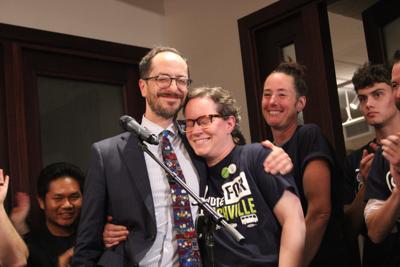This story is a partnership between the Nashville Banner and the Nashville Scene. The Nashville Banner is a nonprofit, nonpartisan news organization focused on civic news. Visit nashvillebanner.com for more information.
The Tennessee Court of Appeals ruled on Tuesday that while Mayor Freddie O’Connell’s transit referendum can mostly go forward as planned, using surcharge funds to purchase land for housing and parks will not be permitted.
“The purchase of land for housing development and parks is not a purchase for the transit system, nor does it ‘provide connectivity for the transportation facility to any other non-mass transit system transportation infrastructure, including, but not limited to, interstates, highways, roads, streets, alleys, and sidewalks,’” Judge Andy Bennett wrote in the unanimous opinion. “Such property is a place of origination or destination. Metro’s goal is laudable, but the IMPROVE Act does not provide the means. Metro will have to find other funds to accomplish this goal.”
Court sides with mayor after fight from conservative activists
The opinion notes that these uses made up only approximately 1 percent of the surcharge revenue and “will not invalidate the plan.”
Emily Evans, chair of the Committee to Stop an Unfair Tax, which brought the lawsuit after advocating against the referendum during election season, tells the Nashville Banner she is pleased with the Court of Appeals’ decision. However, she adds, there are some “murky” pieces of it on which she would potentially like clarification from the Tennessee Supreme Court, pointing out that the affordable housing component of the transit referendum drew lots of support.
“That introduces a question, which is this," says Evans. "If you can’t use the money for a purpose that galvanized a lot of support, and you’re not going to get any federal money — at least not anything meaningful and not in connection with things that you plan to do because policy has changed — when does this referendum stop being what people voted for? And is that valid? Is that fair to the taxpayers?”
But while Evans may be pleased by the decision and looking at the possibility of going to the highest state court, Metro is also happy. Metro legal director Wally Dietz called the ruling an “overwhelming victory."
“The Court’s ruling allows the Transportation Plan to go forward as approved by the voters and Metro will be able to build out the transportation system completely as presented in the referendum,” Dietz writes in a statement. “The Court’s concern over the connection between the Transportation Plan and affordable housing only impacts one percent of the plan which can be financed as needed from non-transit funds.”
Voters give mayor’s $3.1 billion plan the green light
The transit referendum overwhelmingly passed on the November ballot, winning by a 2-to-1 margin.
Represented by attorney Kirk Clements, Evans quickly sued, arguing that the plan’s inclusion of sidewalks and traffic signals exceeded the scope of what is allowed under the state’s IMPROVE Act. Additionally, the suit argued that Metro misled voters about the plan’s cost. But Davidson County Chancellor Anne Martin was unconvinced and ruled in January that Metro’s plan was sound.
Mayor O’Connell also applauded the ruling.
“I’m pleased that once again a court has sided with the people of Nashville who overwhelmingly approved Choose How You Move,” O’Connell says in a statement. “The court’s ruling today, once again, stands with the will of Nashvillians and allows us to implement all elements of the plan as outlined in the transit improvement program, which references the purchase of land explicitly for the construction of transit centers and related infrastructure. Today’s ruling is an overwhelming victory for Nashville.”
This article first appeared on Nashville Banner and is republished here under a Creative Commons Attribution-NoDerivatives 4.0 International License.







